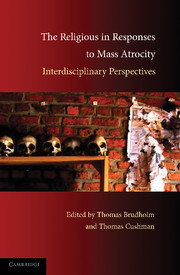Book contents
- Frontmatter
- Contents
- List of Contributors
- Acknowledgments
- Introduction: The Religious in Responses to Mass Atrocity
- Part I Between Necessity and Impossibility: The Role of Religion in the Face of Atrocity
- Part II Does It Help to Import Religious Ideas: Reflections on Punishment, War, and Forgiveness
- Part III Sociologies of the Religious in Responses to Mass Atrocities
- 7 Making Whole: The Ethics and Politics of “Coming to Terms with the Past”
- 8 When Faith Meets History: The Influence of Religion on Transitional Justice
- 9 Genocidal Rupture and Performative Repair in Global Civil Society: Reconsidering the Discourse of Apology in the Face of Mass Atrocity
- 10 Violence, Human Rights, and Piety: Cosmopolitanism versus Virtuous Exclusion in Response to Atrocity
- Index
9 - Genocidal Rupture and Performative Repair in Global Civil Society: Reconsidering the Discourse of Apology in the Face of Mass Atrocity
Published online by Cambridge University Press: 01 September 2009
- Frontmatter
- Contents
- List of Contributors
- Acknowledgments
- Introduction: The Religious in Responses to Mass Atrocity
- Part I Between Necessity and Impossibility: The Role of Religion in the Face of Atrocity
- Part II Does It Help to Import Religious Ideas: Reflections on Punishment, War, and Forgiveness
- Part III Sociologies of the Religious in Responses to Mass Atrocities
- 7 Making Whole: The Ethics and Politics of “Coming to Terms with the Past”
- 8 When Faith Meets History: The Influence of Religion on Transitional Justice
- 9 Genocidal Rupture and Performative Repair in Global Civil Society: Reconsidering the Discourse of Apology in the Face of Mass Atrocity
- 10 Violence, Human Rights, and Piety: Cosmopolitanism versus Virtuous Exclusion in Response to Atrocity
- Index
Summary
Acts of Apology
One of the most interesting developments in political discourse over the last few years has been the emergence of official, public apologies by nations, individuals, religious institutions, and institutions of global governance for their culpability for and failure to prevent atrocities, gross violations of human rights, and genocide. The Queen of England apologized for the treatment of the Maori people by the British Empire, the Roman Catholic Church apologized for the Spanish Inquisition and other acts of violence committed in its name; and the United States, several European countries, and the United Nations have apologized for failing to prevent genocide in Bosnia and Rwanda. Hardly a day goes by, it seems, without a representative of some nation, social institution or group apologizing for the misdeeds of some individual, institution, or group for either doing something to them or failing not to do something for them.
Why has this “age of apology” (Gibney et al., 2008) come about? And what does it mean? Or more to the point, what do apologies mean? Clearly, it was not always the case that powerful nations and institutions have apologized for their acts. Indeed, the opposite has been the case: wars, imperialism, mass killings, and other such nefarious acts have generally been committed in the name of self-defense, material interest, considerations of national interest, realpolitik and simply as ordinary business.
- Type
- Chapter
- Information
- The Religious in Responses to Mass AtrocityInterdisciplinary Perspectives, pp. 213 - 241Publisher: Cambridge University PressPrint publication year: 2009
- 1
- Cited by

